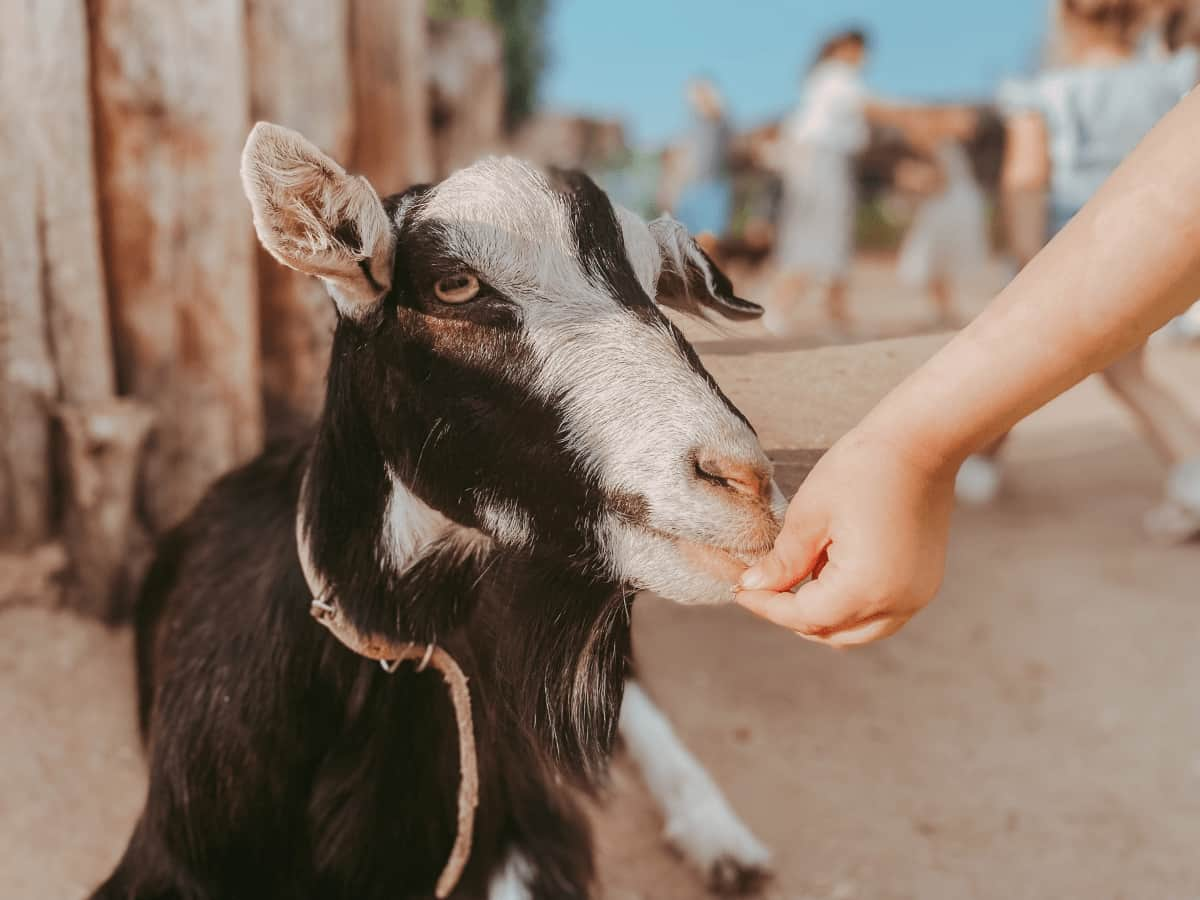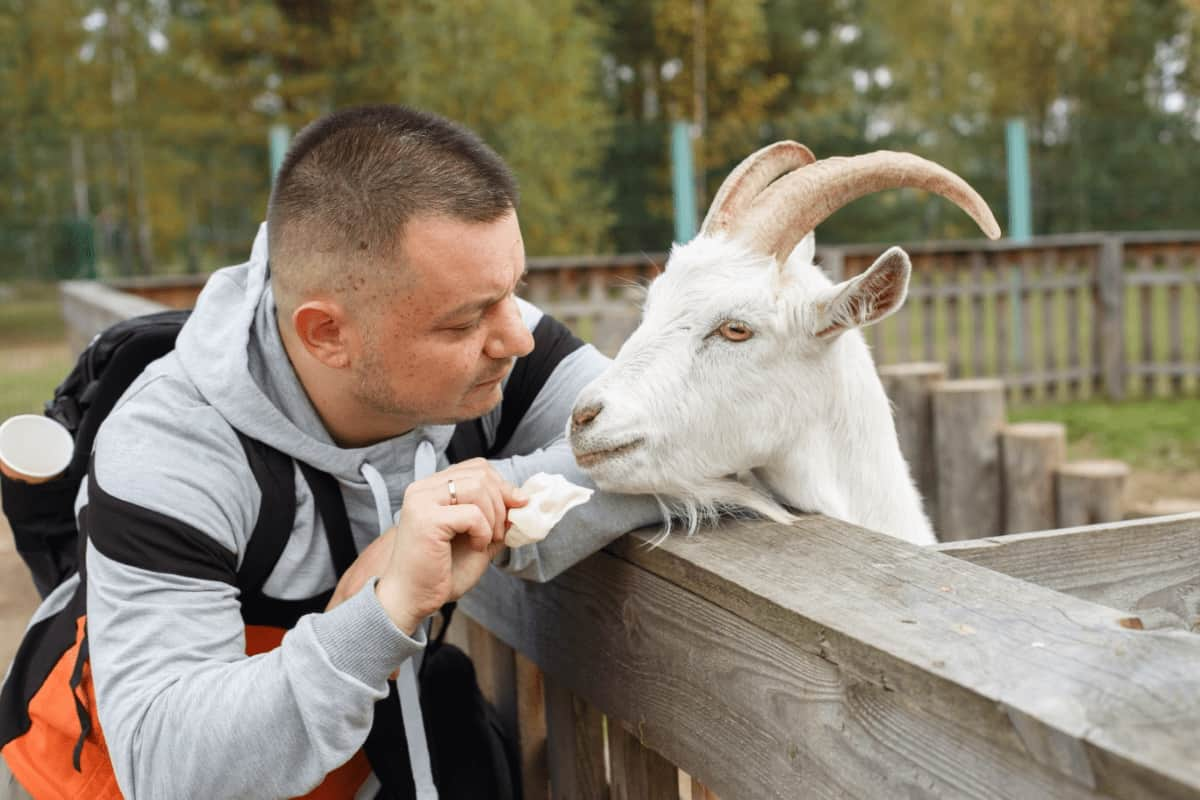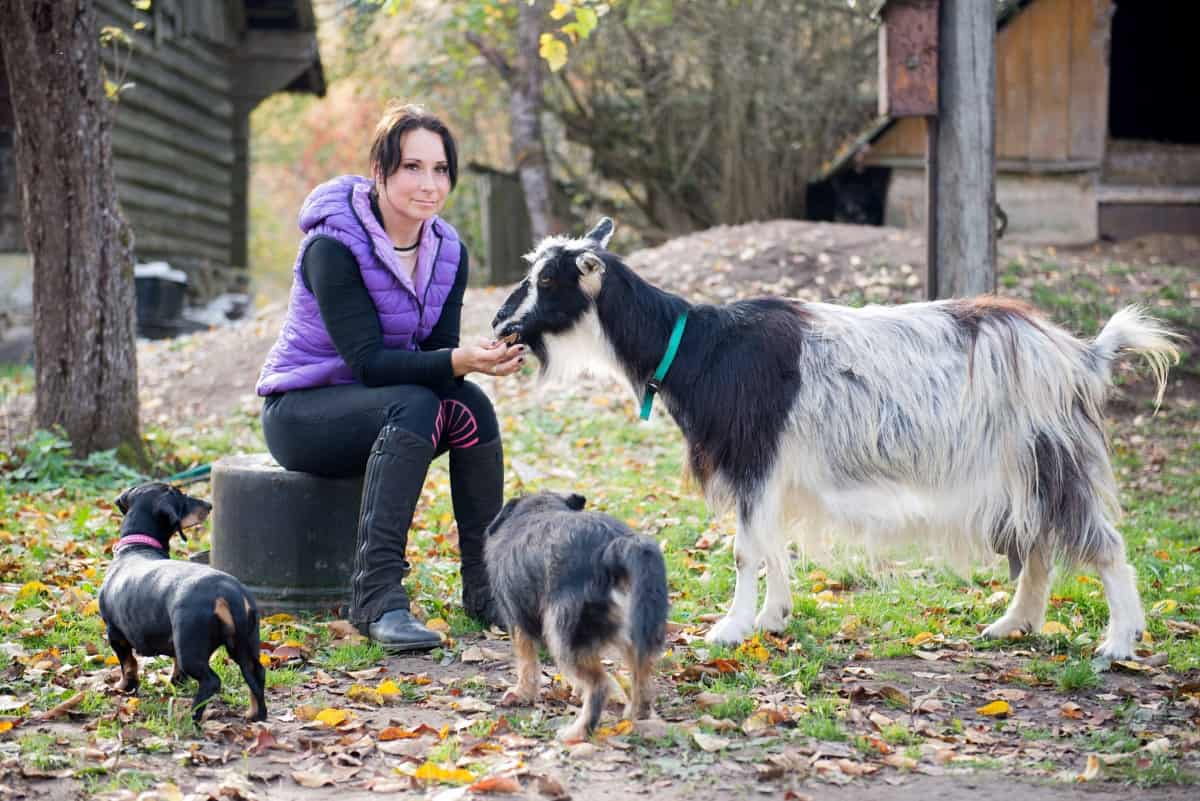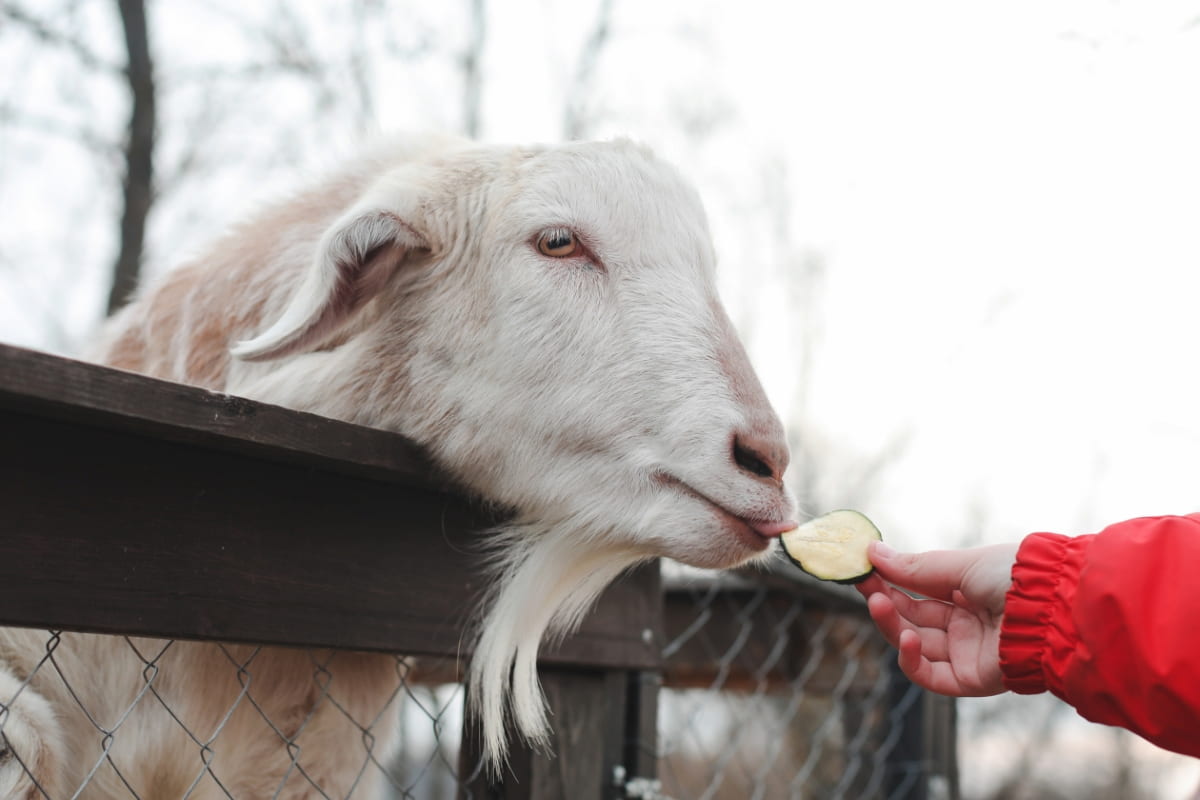The revered for their hardiness and adaptability, Goats often find a special place in many homesteads. Goats, like humans, are curious eaters and often find themselves nibbling on various foods. One common question that many homesteaders ask is, “What human food can goats eat?”. Many harmless or beneficial foods can be potentially dangerous to goats. As goat keepers or those interested in their well-being, we must discern what’s edible and hazardous for these spirited creatures.

Can Goats Eat Bread? Understanding the Impact of Bread Consumption
Bread is a staple in many households, but is it safe for goats? While it’s not toxic, bread, especially in large quantities, is not ideal for their digestive system. High in carbohydrates and low in nutritional value, bread can cause bloating and digestive upset if fed in excess. Moreover, moldy or stale bread can be dangerous, potentially causing mycotoxin poisoning and severe health issues. Thus, it’s advisable to give bread sparingly and ensure it’s fresh.
Cheese and Goats: Exploring the Compatibility and Potential Risks of Feeding Cheese to Goats
Cheese, a delicious dairy product, has always been associated with goats. Goat cheese is popular worldwide, but can goats eat cheese? In moderation, yes. Cheese is safe for goats, but it’s essential to consider the type and amount. Soft cheeses or those with added flavors and preservatives might not be ideal. Overfeeding cheese can lead to digestive problems and obesity, given its high-fat content. So, while it’s a treat, it should not be a regular component of their diet.
Bananas for Goats: Evaluating the Benefits and Drawbacks of Including Bananas in a Goat’s Diet
When it comes to fruits, many wonder, “Can goats eat bananas, and what about banana peels?” The answer is yes; goats can enjoy bananas, including peels. Bananas are rich in nutrients, making them a good treat. However, they should not make up much of a goat’s diet due to their sugar content. While bananas are safe, some fruits are not. It raises another question: What fruit can goats not eat? Citrus fruits, for instance, are a no-go as they can cause digestive upset.
Rice and Goats: Unraveling the Effects of Rice Consumption on Goats’ Digestive System and Overall Well-being
Rice is a universal food; in some regions, it might be tempting to feed goats leftover rice. But is it advisable? Cooked rice in small amounts won’t harm goats. It’s easy to digest and free from toxins. Yet, its nutritional worth is restricted, and similar to bread, excessive consumption can result in weight increase and digestive problems. Additionally, uncooked rice should be avoided due to the risk of choking and digestion problems.
In case you missed it: Ultimate Guide to Start Backyard Goat Farming: Setup and Care

Apples and Goats: Examining the Suitability of Apples as a Dietary Component for Goats
Apples are another human food that goats can safely eat. Crunchy and sweet, they offer vitamins and fiber beneficial for goats. “Can goats eat apples?” Yes, they can, but with a caveat. Always remove the seeds as they contain cyanogenic compounds, which can be harmful in large amounts. Similarly, questions like “Can goats eat tomatoes?” arise. Tomatoes are safe, but feeding the green parts can be toxic, so it’s crucial to be cautious.
Peanut Butter and Goats: The Potential Benefits and Risks Associated With Feeding Peanut Butter to Goats
Peanut butter, a favorite for many, might be an unconventional treat for goats. While not toxic, it’s dense in fats and should be given in moderation. It provides a good energy source, especially in colder months. However, commercial peanut butter with high sugar and salt content should be avoided. Instead, opt for natural, unsalted versions if you treat your goat with this sticky delight.
Goats’ Dietary Restrictions: Understanding the Limitations and Restrictions in a Goat’s Diet for Optimal Health
Understanding what to avoid with goats is essential for their health and longevity. While many human foods are safe in moderation, some can be deadly. What can kill a goat overnight? Plants like oleander, rhododendron, and some types of ivy are highly toxic. Additionally, processed foods, chocolates, and foods high in sugars and fats can lead to health problems. Furthermore, ensure their main diet comprises hay, fresh grass, and specialized goat feed. Also, it’s beneficial to know what vegetables goats can eat. Leafy greens, carrots, and cucumbers are among the favorites. However, always introduce new foods gradually and observe for any adverse reactions.
In case you missed it: British Alpine Goat Facts: Origin, Physical Characteristics, Pros, and Cons

What Goats Can’t Eat Around Your Homestead/What Not to Feed Your Goats
Avocado: While avocados are a favorite for many humans due to their health benefits, they’re unsuitable for goats. They contain a toxin known as persin. When consumed in significant amounts by goats, it can pose severe health risks. It’s wise to steer clear of feeding these animals avocados or any avocado-based products.
Chocolate: While delightful for humans, chocolate is a strict no-no for goats. The theobromine present in chocolate is extremely toxic to them. Consuming chocolate can cause health issues like higher heart rate and seizures. In severe situations, it can result in death, making it vital to keep all types of chocolate away from them.
Onions and Garlic: While onions and garlic might be staple ingredients in our kitchens, they’re detrimental to goats. These edibles can damage a goat’s red blood cells, leading to anemia. Keeping these and any dishes containing them away from goats is essential.
Caffeine: Humans might rely on caffeine for a morning jolt, but it harms goats. Exposure to caffeine can lead to symptoms like restlessness, tremors, and a significant increase in heart rate. In extreme instances, it might even cause death. Ensure all caffeinated products are securely stored away from goats.
Potato Leaves and Green Tomatoes: Potato leaves and green tomatoes might seem harmless, but they contain solanine, a toxic substance to goats. Feeding these can have detrimental effects if ingested in large amounts. The best practice is to avoid these plants and their derivatives altogether for your goat’s diet.
Rhododendrons and Azalea: While Rhododendrons and Azaleas beautify gardens, they are death traps for goats. These plants house grayanotoxins, deadly if ingested by goats. It’s important to ensure your goats do not graze or even get near these plants.
Lilies: Certain lilies, especially the Easter lilies, can spell doom for goats. Consuming these can lead to kidney failure, so they should always be kept at bay. Ensure your goats cannot access or consume these toxic flowers.
Rhubarb Leaves: Rhubarb might be used in various dishes for humans, but their leaves are harmful to goats. They include oxalic acid, which can be harmful if consumed excessively. It’s prudent to avoid feeding goats any part of the rhubarb plant.
Walnuts: Walnuts might be nutritious for humans, but they contain a toxin known as juglone, which is detrimental to goats. Even a small amount can cause harm, so keeping these nuts and any products containing them away from goats is crucial.
Moldy or Spoiled Food: Freshness is key when feeding goats. Moldy or spoiled food can harbor harmful toxins that severely affect a goat’s health. Always ensure that any food offered to goats is fresh, wholesome, and contamination-free.
In case you missed it: Discovering the Untapped Opportunities for Goat Products

Conclusion
Maintaining the health and vitality of goats on a homestead is both a responsibility and a reward. Their well-being directly corresponds to our care and attention, especially regarding their diet.
- Feed Your Flock for Less: Top 10 Tips to Save on Chicken Feed
- Ultimate Guide to Ossabaw Island Hog: Breeding, Raising, Diet, and Care
- Hatching Answers: The Top 10 Reasons Your Chickens Aren’t Laying Eggs
- Eggs and Economics: Breaking Down the Cost of Raising Backyard Chickens
- Defend Your Greens: Proven Methods to Keep Iguanas Out of Your Garden
- Ultimate Guide to Cinnamon Queen Chicken: A Comprehensive Guide for Beginners
- Ultimate Guide to California Tan Chicken: Breeding, Raising, Diet, Egg-Production and Care
- Ultimate Guide to Marsh Daisy Chicken: Breeding, Raising, Diet, and Care
- 10 Types of Chicken Farming Businesses You Can Start for Profits